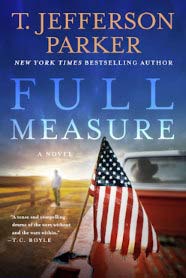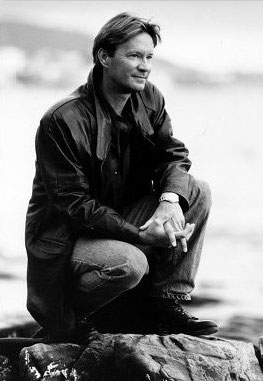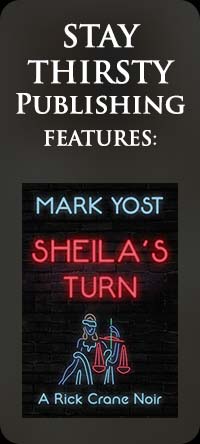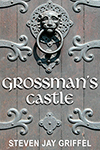

By Steven Jay Griffel
Queens, NY, USA
Most popular authors who write inside the conventions of a specific genre tend to stick with their winning formula. But after years of writing hugely popular crime novels (including Silent Joe and California Girl, both winners of the Edgar Award for Best Mystery), New York Times bestselling author T. Jefferson Parker has migrated towards a more mainstream type of fiction. I had the pleasure of meeting with him this fall for this Conversation.
STEVEN JAY GRIFFEL: Why the change in direction?

T. JEFFERSON PARKER: This last novel of mine, Full Measure, came to me as a gift. I live in Fallbrook, a small town in San Diego County that abuts Camp Pendleton, and was hit very hard by our so-called Great Recession. It's a cute little town, very Main Street America, in my eyes. In about 2010, I began to see combat Marines coming home through Pendleton and I struck up conversations with several of them. Some of them were part of the legendary 3/5, the "Dark Horse" battalion, which has its roots back in World War I in France.
The more I talked to these very young men, and found out about their travail and heroism in Sangin Valley of Helmand Province of Afghanistan – at the time one of the hotbeds of Taliban power – the more I saw that I had to write their story. They'd sustained higher casualties in Sangin than any other battalion in Afghanistan. Terrible losses. I couldn't see their story in terms of a mystery or a thriller. It had to be a story about a young combat Marine returning from Sangin and trying to pick up the pieces of his life after a very bloody year. I had to change direction to tell Full Measure.
STEVEN JAY GRIFFEL: How do you feel about the terms literary and literature, especially in terms of your own writing?
T. JEFFERSON PARKER: I've always tried to write with the highest literary standards I could manage. Even way back thirty years ago in Laguna Heat, as a very young and inexperienced writer I was trying my best to sound literary! Even in the first sentence of that book! I think there are mysteries of literary value, and attempted literature that is poorly written. So you really need to vet them individually. We all might have different opinions on which books fall into which camp.
STEVEN JAY GRIFFEL: In your current novel, Full Measure, you seem to have your finger on the pulse of many contemporary issues, such as the military strife in the Middle East and the national economy. What do you see as the pros and cons of being so topical?
T. JEFFERSON PARKER: I can't really see a downside. For today's readers, Full Measure will hopefully seem truthful, contemporary, and pertinent. Thirty years from now? Well, if the book is still being read then, it will seem, I hope, like an accurate "snapshot" of the moment in time and place in which it was written. Maybe it's my old journalist's training kicking in, but I think getting the facts right is good and important in fiction.
STEVEN JAY GRIFFEL: You use the classic dialectic of nature v. nurture to inform your characterization of the main characters, Ted and Patrick. Your thoughts?

T. Jefferson Parker (credit: Kari René Hall)
T. JEFFERSON PARKER: I've been banging my head up against that one my whole life, it seems. I am just absolutely fascinated by the idea that two people – even brothers or sisters – can grow up in the same family, same place, at the same time – and turn out so differently. I leap back quickly to Cain and Abel, Jacob and Esau. Why and how did they turn out so differently? I don't think our lives are fated. I think we fight our way through. But I do think that at birth, we are given our natures and much of what constitutes our separate lives is what we do with that nature. So, that struggle between what we are given and what we want, becomes the energy that drives a book like Full Measure.
STEVEN JAY GRIFFEL: Both brothers make life-defining choices in which they weigh altruistic motives against self-directed needs. Were these choices based on decisions you faced personally?
T. JEFFERSON PARKER: I think Patrick and Ted and all the rest of that are making choices like that every day. Maybe in fiction, there is a higher concentration of life-defining choices made per day than in real life! Such is drama. That is such a hard thing – acting on your own behalf, or on the behalf of others, such as those you love. Hopefully, hopefully those two interests don't stand in opposition too often.
STEVEN JAY GRIFFEL: Two great authority figures – the Government and the father – loom forbiddingly large in the novel. Your thoughts?
T. JEFFERSON PARKER: Certainly the idea of "big government" is one of the big political issues in America, throughout our long history. It's the hottest of topics and the arguments are long and loud. "Topic" is the wrong word, I see, because the question of government power goes all the way back to the Constitution here in this country. I grew up in an arch-conservative household in suburban Orange County, California. It was literally John Birch Society country. So my views of government are framed by that. Perhaps not oddly, I'm a liberal now – very different than you might figure.
So far as the father figure is concerned, I write about fathers often because my own father was such a big part of me. He was powerful and capable and absolute at times. He taught me to throw a baseball and catch a fish. I always wanted to be as good as him, if not better. One of the reasons I went into writing fiction was because my father had no time for it, really. So that provided me with my own "turf," my own place where I could excel and maybe even someday accomplish something my father could not. I should say that he was immensely proud of the fact that his son was a published author. He beamed.
STEVEN JAY GRIFFEL: A number of Biblical themes or paradigms run through the novel. How conscious of this were you when developing these ideas?
T. JEFFERSON PARKER: I love Bible stories and use them when I can! Full Measure is dense with them, as you noted. For me, those stories are the elements of my experience and the animators of my imagination. They are the first stories, the true ones. They are often so inscrutable, though, aren't they? I mean, why is it that God accepts Jacob's offering and disses the offering of his brother, Esau? Answer me that. I took a "Bible as Literature" class in college as a freshman. Loved it. Irrespective of what I believe or don't. Later, I read the Bible from start to finish. I may do it again before it's too late.
STEVEN JAY GRIFFEL: It appears that your book's title was inspired by the words below from the Gettysburg Address:
It is rather for us to be here dedicated to the great task remaining before us—that from these honored dead we take increased devotion to that cause for which they gave the last full measure of devotion …
T. JEFFERSON PARKER: The Gettysburg Address is the single best "page" of writing in the English language that I know of. I read and reread it. Tingling scalp, teary eyes, the whole deal. To so cleanly and economically describe that war and that battle just takes my breath away. My wife and I took our young son to Gettysburg two years ago – a highlight to say the least. Stood there right where it was delivered. So, to be able to bag those two words – full measure – and use them selfishly as the title for a book, was certainly Grand Theft Literature as far as I was concerned. Guilty as charged. I don't think Lincoln would have cared. In some very basic way, I think we all give our full measures of devotion. That's what life demands. It's the ante. Okay. I'm in.
STEVEN JAY GRIFFEL: Your next book – Crazy Blood – comes out in March. What can you tell us about this new novel?
T. JEFFERSON PARKER: It's about two half-brothers who compete ferociously for a spot on the next U.S. Olympic ski-cross team. Ski-cross is a newish Olympic sport – mix of downhill racing and slalom, maybe with a touch of NASCAR thrown in. It's fast and kind of dangerous and thrilling to watch. The half-brothers are ruled by all sorts of past calamity – the murder of their mutual father, their births to different mothers. So here comes all of the nature/nurture stuff again, on skis! It's a very exciting novel. I had fun writing the ski-racing scenes because I'm basically terrified when I ski down a mountain.
Links:
Steven Jay Griffel at Stay Thirsty Publishing
Steven Jay Griffel on Facebook








